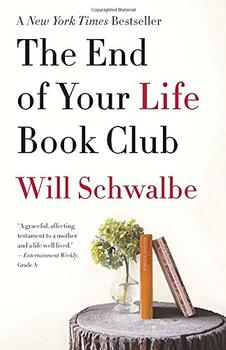Summary | Excerpt | Reading Guide | Discuss | Reviews | Beyond the Book | Readalikes | Genres & Themes | Author Bio

Some novelists start with opening lines that foretell the major action of the book; some begin with hints; others with words that simply set a scene or describe a character, showing the reader a world before a deluge - with no hint as to what is to come. What never needs to be written is: "Little did she know her life was about to change forever." Many authors adopt something like this when they want to create suspense. The truth is that people never realize their lives are about to change in unforeseen ways - that's just the nature of unforeseen ways.
We were no different.
The year 2007 had begun with Mom and Dad spending some weeks in Vero Beach, Florida, a place Mom discovered late in life and loved. I remember now with some guilt repeating to her a line I'd heard a comedian say about Florida: "It's where old people go to die and then don't."
All of us were scheduled to visit at one point or another, and everyone in the family was, at the time, happily busy. My brother, Doug, had just produced a new film version of Lassie, Come Home. My sister, Nina, was working for the TB Alliance, fighting the spread of tuberculosis around the world. I was getting David Halberstam's book on the Korean War ready for publication and was also promoting a book about email that I'd written with a friend. Dad was busy with his business representing concert artists: conductors, singers, and musicians. We obsessed about the anxieties and minor tiffs and tiny ailments (toothaches, headaches, insomnia) that all people have. And then there were birthdays to remember and events to be planned and travel arrangements to be made and schedules to be shared. With my family, there was a ceaseless flow of requests, made of one another on behalf of our friends and causes: Could we come to a fund-raiser? Could we make an introduction? Could we recall the name of the woman at the concert who was wearing the red dress? We also bombarded one another with recommendations, often phrased as commandments: You must see ... You must read ... You must watch ... The bulk of these came from Mom.
If our family was an airline, Mom was the hub and we were the spokes. You rarely went anywhere nonstop; you went via Mom, who directed the traffic flow and determined the priorities: which family member was cleared for takeoff or landing. Even my father was not immune to Mom's scheduling, though he was given more leeway than the rest of us. The frustration among us offspring had to do with how carefully everything needed to be planned. Just as one late plane can throw off the whole operation of an airport, resulting in backed-up flights and people sleeping in corridors, so, Mom felt, any change could throw our lives into chaos. My brother, sister, and I were, as a result, mildly terrified of making even the smallest alterations to plans once they had been discussed with Mom.
When I called Mom in Florida that February to let her know I'd decided to take an afternoon flight from New York instead of a morning one as we'd previously discussed, she first just said,"Oh," but I could hear a massive hint of exasperation in her voice. Then she added: "I was thinking that if you got in that morning, we could go see the couple next door for lunch; they leave that evening, so if you're on the later flight, then you won't be able to see them at all. I suppose we could ask them over for coffee in the afternoon, but that would mean that we couldn't go to Hertz to add you to the registration on the car, and then I would need to drive to Orlando to pick up your sister. But it's okay. I'm sure we can figure out how to make it all work."
Mom didn't confine herself to coordinating our lives. She was also helping to coordinate, almost always at their request, the lives of hundreds of others: at her church, at the Women's Commission for Refugee Women and Children (she'd been the founding director), at the International Rescue Committee (she'd been board-staff liaison and founded the IRC's UK branch), and at all the other myriad organizations where she'd worked or served on boards. She'd been director of admissions at Harvard when I was growing up - and then a college counselor at one New York school and head of the high school at another - and she remained in contact with hundreds of former students and colleagues. There were also the refugees she'd met in her travels all over the world, and with whom she kept in touch. And there were all her other friends, too - who ranged from childhood intimates to people who'd happened to sit next to her on a plane or cross town bus. My mother was always introducing, scheduling, weighing in, guiding, advising, consoling. Sometimes she said it exhausted her - but it was pretty obvious that mostly she loved it.
Excerpted from The End of Your Life Book Club by Will Schwalbe. Copyright © 2012 by Will Schwalbe. Excerpted by permission of Knopf. All rights reserved. No part of this excerpt may be reproduced or reprinted without permission in writing from the publisher.
Your guide toexceptional books
BookBrowse seeks out and recommends the best in contemporary fiction and nonfiction—books that not only engage and entertain but also deepen our understanding of ourselves and the world around us.